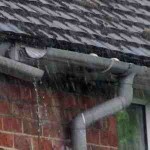 Did Old Man Winter Damage Your Western NY Roof?
Did Old Man Winter Damage Your Western NY Roof?
Once March and April roll around, everybody and everything in Western New York may be more than ready for spring. But your roof may need a bit of perking up after winter’s harsh and relentless beating. Winter roof damage is a fairly common issue we see during our Buffalo and Rochester area home inspections, with four of winter’s most wicked culprits outlined below.
Ice Dams
Ice dams can develop on the outer edges of your roof, resulting in winter roof damage that leads to leaks. Their formation process starts with the warm air rising from your home’s interior, heating up your roof’s shingles. Snow that’s covering the shingles begins to melt, flowing toward the edges of the roof.
Since the edges of the roof are typically colder than the center, the water refreezes and forms the ice dams. When the dams become thick enough, they can prevent additional snow-melt from draining off your roof. The trapped water can eventually seep beneath your shingles and into your home through weakened points.
Future prevention involves ensuring your attic is well-insulated and well-ventilated. Regularly cleaning out downspouts and gutters, especially before next winter’s big chill, can also help.
Icicles
Icicles may look gorgeous dangling from the eaves, but they’re also known for damaging gutters and shingles. Avoid future icicle issues by eliminating rooftop warm air leakage with improved insulation. You can also remove icicles as quickly as they form, provided you do so carefully with a long-handled tool or on a stable ladder carefully placed away from slippery surfaces.
Attic Condensation
When snow, icicles and ice dams are clogging up your roof, the ceiling right below the roof can end up with a buildup of excessive condensation. Condensation can eventually lead to mold and wood rot, two issues you definitely want to avoid. Future fixes can include improving attic ventilation, as well as ensuring the attic floor is properly insulated to prevent heated air from your living space below from seeping in.
Massive Snow Loads
Even if your Western New York roof was designed to handle heavy snow loads, it’s always a good idea to keep an eye out for creaks, leaks and sagging ceilings that can indicate a collapse waiting to happen. Poor drainage, construction or maintenance issues can weaken your roof over time, with heavy snow loads providing an additional layer of stress.
Regular home inspections, coupled with proper roof maintenance, can help prevent smaller roof issues from becoming major roof problems. Spring is a prime time for a comprehensive roof inspection to ensure you don’t have any lingering winter roof damage that requires precise and immediate attention.


